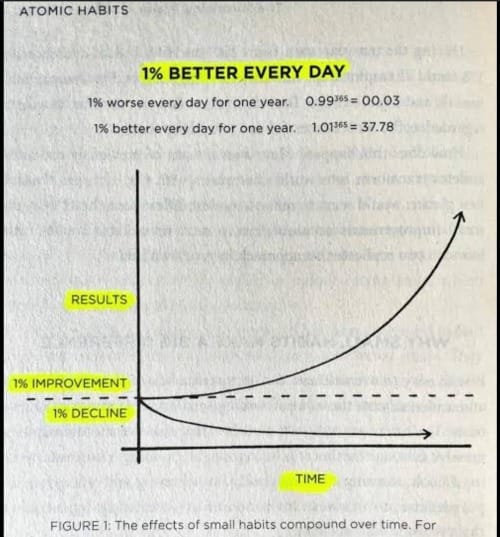Lately, I’ve been coming across a few graphs about the power of daily habits.

“Be 1% better every day” – many proclaim this on LinkedIn. This is also the premise of the very famous book Atomic Habits, which, by the way, I haven’t read yet.
In general, I haven’t liked such things, and I’ve also been quite skeptical about them, based on my experiences. Experience usually shows that it’s possible to form, maintain, and force such habits, but after a while, they tend to fade away.
I think of myself as not being good at these things—at forcing uncomfortable habits—but I always have to realize that reality doesn’t entirely reflect this belief.
For the past year, I’ve been tracking my expenses on a daily basis, and if we don’t count a few breaks of a month or two, it’s soon going to be 10 years since I started.
Of course, many people—especially skeptics (or the wealthy, haha)—often question whether this makes sense. I could list countless reasons why it does.
It’s worked for me, and for others, it’s some other, similarly disciplined, often uncomfortable habit that works.
I moved to Malta in May with relatively specific goals. These included learning English, developing my business skills, acquiring new ones, and taking our spin-off product abroad. And, of course, breaking out of my comfort zone and gathering experiences and opportunities that aren’t available at home.
As I enter the last month of my six-month assignment, I have to admit that some of these goals haven’t been achieved.
The reasons are multifaceted, but that doesn’t soften my disappointment.
However, I had a valuable conversation with a friend about this, which put things into a slightly different perspective.
The essence was that I was confronted with, “Okay, there were many things you went for and didn’t get, but as I understand it, there are many things you didn’t go for, yet you got anyway.”
And what are these?
The everyday habits mentioned in the title.
You should know that my life in Budapest had been completely different in the past few years.
Was it more exciting?
You could say that. But it was also more exhausting, costly, and stressful, with far more impulses and people around me.
Did I come here to slow down?
Not necessarily, but I definitely came to make some changes.
After 12 years of competitive sports and daily training, followed by a 5-year break, I’ve started exercising daily again, and I find joy in it. Of course, I get tired sometimes, emotionally as well, but that’s natural, and perhaps it’s also a result of the sunset creeping in, pushing me to rush.
Cooking became a daily part of my routine from the beginning. For many people, this is basic, but they should think back to how it was in the beginning when they started. Filled with mistakes, impatience, complexity, and all those things that are much easier today.
Consuming English content (podcasts, books, videos, movies) has become so ingrained that, with few exceptions, I now find Hungarian broadcasts quite jarring.
My sleep here is very poor, but I try to be strict with myself and only read after 11 p.m., avoiding my phone. Unfortunately, I’ll probably never be an early bird, but I’m trying to establish a proper circadian rhythm. The Sleep Cycle app and my Polar watch, which I’ve recently been using for every night’s sleep, help monitor this.
Learning English separately (vocabulary building, grammar), as well as practicing meditation and breathing exercises (Headspace, Insight Timer, Huberman NSDR), are my latest tasks that I’m working on making part of my daily routine. Just like taking cold showers and reducing my consumption of social media, which induces dopamine dependence.
I’m trying to push myself towards a slightly stricter, more structured life filled with routines, which will hopefully lead to a more balanced and healthier life in the long run.
Here’s a bit of a spoiler: in the short term, this doesn’t necessarily yield such straightforwardly positive results. This level of structure, combined with dopamine deprivation, can feel like a bit of a roller coaster. But I trust ChatGPT, who said:
“This process (normalizing dopamine levels) varies by individual, but generally takes 2-3 months. In the first few weeks, it’s common to experience temporary discomfort, irritability, or moodiness as the brain still ‘craves’ quick rewards. As you continue with the changes, dopamine production gradually stabilizes, leading to a more balanced feeling in the long run.”
Wanting to change something is often the result of a conscious process rooted in some kind of dissatisfaction.
Whether these changes will be permanent or what their outcome will be is often uncertain, but as I said, I came to Malta with specific goals. Some of these (on a deeper level) involved creating change and moving toward a healthier, more balanced life.
Looking at it from this perspective, it’s clear that many of the changes I came for have indeed been established.
We’ll see how lasting they are once I return home.
Thanks to Gabi for often highlighting the essence I don’t see, and thanks to Andrew Huberman for making it so I don’t have to adjust the water temperature during my shower.
And a bit of an update regarding my last post: I managed to arrange a pleasant conversation with Chris from RemoteBase.co, and while my Maltese experiences didn’t make it into their latest newsletter, maybe that will happen in the future… :)




